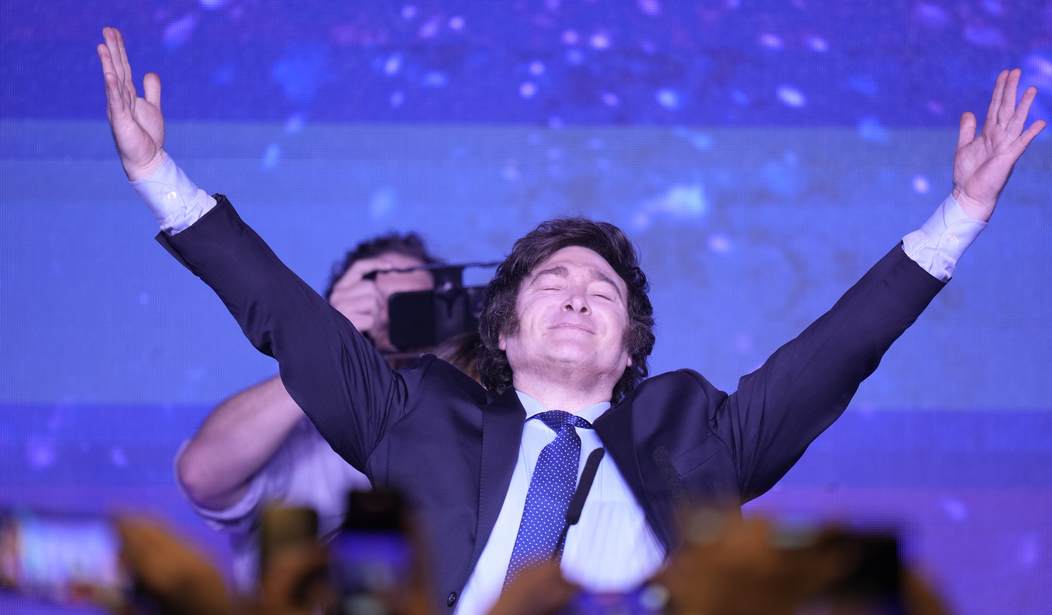For the first time in decades, Argentina is no longer ruled by socialists. Libertarian-leaning President Javier Milei was officially sworn in on Sunday, marking a major turning point in the country's battle against hyperinflation and economic decline.
In November, Argentina reached 183 percent inflation for 2023, impoverishing around 40 percent of the country, a reality that helped sweep Milei into power. Now, he's taking action, with his first move in office being an executive order that slashes the number of government ministries from 21 to nine. Among those put on the chopping block was the ministry of "women, genders, and diversity," a move he recently telegraphed in his criticisms of "social justice."
On his 1st day in office, President Milei signs an executive order, reducing government from 21 ministries to 9
— Visegrád 24 (@visegrad24) December 11, 2023
Interior, exterior, economy, justice, infrastructure, foreign affairs, security & defense all stay
Education, healthcare, culture, women’s rights etc out (Afuera!) pic.twitter.com/12Cqq9ZUu6
It didn't take long for the hand-wringing to begin in the press. PBS News published an article dripping with sanctimony, claiming that Milei's ideas are "outlandish" and "radical." What makes that so ironic is that the very same article admits that Argentina is in dire straits.
South America's second largest economy is suffering 143 percent annual inflation, the currency has plunged and four in 10 Argentines are impoverished. The nation has a yawning fiscal deficit, a trade deficit of $43 billion, plus a daunting $45 billion debt to the International Monetary Fund, with $10.6 billion due to the multilateral and private creditors by April.
(...)
Argentines disillusioned with the economic status quo proved receptive to an outsider's outlandish ideas to remedy their woes and transform the nation.
Let's play this out. Argentina is in the midst of an economic collapse in which its central bank has inflated the currency by triple digits in the last year, and the nation still has no money to pay its international debts. Yet, it's "outlandish" to cut spending and try to tame inflation?
I'd be curious if PBS News ever described the former socialist regime's policies as "outlandish" as they destroyed Argentina's economy and sent nearly half of its residents into poverty. Somehow, I doubt they did.
Still, there are signs that Milei has not given up his radical plans to dismantle the state. Already he has said he will eliminate multiple ministries, including those of culture, environment, women, and science and technology. He wants to meld the ministries of social development, labor and education together under a single ministry of human capital.
Is it radical to "dismantle" a state apparatus that has completely failed the people it is meant to represent? I'd suggest that's the farthest thing from radical. Rather, it strikes me as common sense. What would be radical is continuing to do what brought Argentina to the brink of collapse (and perhaps past it).
Still, Milei will face opposition. Aside from the press, his moves are triggering the unions as well.
Still, he is likely to encounter fierce opposition from the Peronist movement's lawmakers and the unions it controls, whose members have said they refuse to lose wages.
That sounds familiar, doesn't it? Argentina's economy has been driven off a cliff, and the very people who did the driving want to make sure they suffer no consequences. It's going to be a tough haul, and Milei may yet fail simply because of the structural barriers holding necessary change, but I hope he does everything he can to bust the union cartels up.
Argentines have a choice. They can let Milei do the hard work and return their nation to prominence in the long term, or they can turn tail and run back to the socialists the moment things get difficult. Hopefully, they are smart enough to do the former.














Join the conversation as a VIP Member